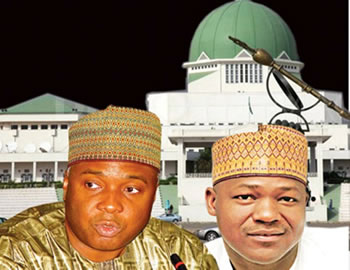The Eighth National Assembly recorded its first year on June 9, 2016. Its leadership thus provided a record of its achievements in the year. Both the Senate President and the Speaker of the House of Representatives believe that the National Assembly has performed better than previous assemblies. The two leaders, in their separate assessments of the National Assembly, based their position on productivity, specifically the quantity of bills and resolutions passed by both chambers.
According to Senate President Bukola Saraki, the Senate has passed 300 bills, including very significant ones such as the Electronic Transaction Bill 2015, Debt Recovery and Insolvency Bill 2015 and the Railway Transformation Bill, and made 162 motions. It is also working on the Nigeria Infrastructure Fund Bill and the National Road Fund. Furthermore, the Senate has, in collaboration with international partners and the private sector, researched into the ways and means of improving the business environment to attract investment. In the process, it identified 54 laws that must be brought in line with international best practices in order to open up the business environment for private investment and business. This led to 15 major economic reform bills and seven business environment bills that would help to jump-start the economy and improve the living conditions of Nigerians.
Similarly, Speaker Yakubu Dogara announced that the House received a total of 685 bills and considered over 530 motions. He noted that the relatively high number of bills considered in the first year derived from the review of over 250 laws of the federation carried out by the House with the help of renowned jurists, lawyers, civil society advocates and other stakeholders, while 130 bills passed the First Reading on a single day in 2015. The Speaker compared these achievements with the 591 bills introduced in the Seventh National Assembly in four years. The Seventh Assembly passed 123 bills and considered 115 motions in four years. The Speaker thus surmised that the House had been innovative by introducing sectoral debates, carrying out a legislative needs assessment of the National Assembly, and drafting the legislative agenda of the House.
We commend the Eighth National Assembly for its performance in making motions and passing bills. We, however, remind the Assembly that its performance should not be assessed in terms of the number of bills and motions alone. Other functions and internal development of the Assembly as an effective institution of governance and democracy are equally important. Apart from the consideration and passage of bills and motions, the National Assembly plays important representational and oversight roles. Indeed, it is in effective oversight that it can ensure value for money and positively affect the living conditions of ordinary Nigerians.
So far, however, there is no evidence that the Eighth National Assembly has been effective in carrying out oversight functions. One of the factors that has rendered the Assembly a weak oversight body is the fact that it is not transparent in its own activities, especially its budget. How can the National Assembly effectively monitor the budget being implemented by the executive when its own budget is shrouded in secrecy? The leadership of the Assembly had promised to shed light on its budget by publishing the details, but it is yet to do so one year after.
Secondly, the National Assembly is supposed to be close to its constituencies, engaging in constant interaction with them to effectively determine their aspirations and bring them to bear on governance, thereby making government responsive and responsible to the people. The Eighth National Assembly has not addressed this aspect. Besides, it is supposed to work with the executive to ensure effective governance. The relationship between the executive and the legislature has neither been cordial nor characterised by mutual respect. There were issues over the appointment of the leadership of the National Assembly, the 2016 budget, purchase of exotic cars for legislators, and the President of the Senate being on trial at the Code of Conduct Tribunal (CCT) for alleged false assets declaration.
Concerning the development of the legislature as an institution of democratic governance, it must be noted that the committee system is the engine room of every legislature. How effective have the committees of the National Assembly been? Can the Assembly boast that its committees are properly funded? Besides, over 70 per cent of the National Assembly members are new comers. What forms of training have they received in the past year? With an opaque budget, committee members are not likely to be aware of the budget of their committees. It is not clear what resources are available for training. The National Assembly budget seems to be the preserve of the leadership and a few in the appropriation committee. This does not augur well for institutional development and capacity building. It is no wonder that the 2016 budget was dogged by allegations and counter allegations of missing budgets, padding and omission of certain key projects between the executive and the legislature.
Members of the two chambers of the National Assembly must set aside their self-interests, especially where they contradict the national interest and the interest of their constituencies, and concentrate on the business of lawmaking, oversight and representation functions in order to achieve the goals of the parliament. They must continuously seek to develop the internal operating system of the parliament in order to be more transparent, effective and efficient. The National Assembly must open up on its budge, introduce the electronic voting system, build the capacity of its members through training, and deepen interaction with its constituencies.




